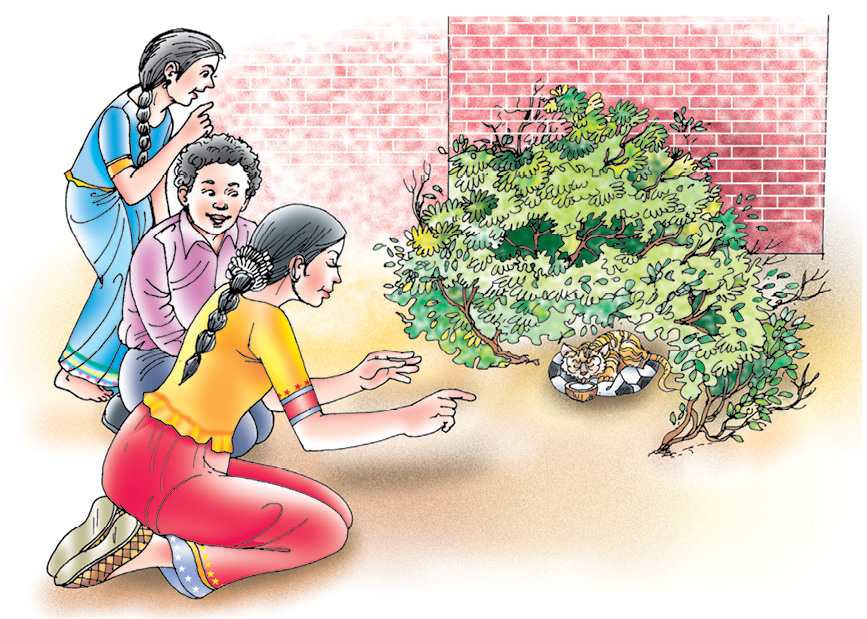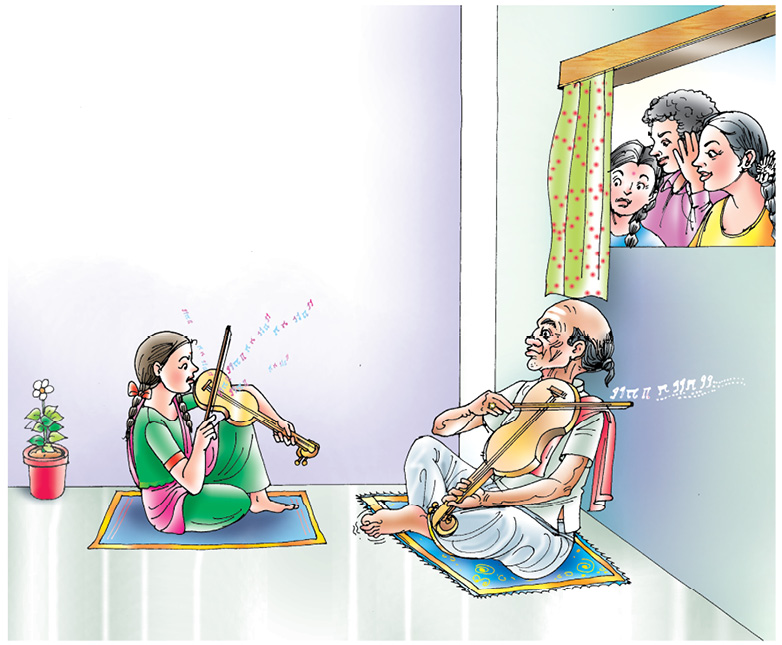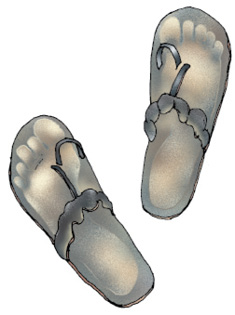Table of Contents

2
Before you read
Mridu is a young girl growing up in Madras (now called Chennai) with Tapi, her grandmother, and Thatha, her grandfather. One afternoon Tapi takes her to her aunt Rukku Manni’s house to meet her cousins Lalli, Ravi
and Meena.
A Gift of Chappals
I
A smiling Rukku Manni threw open the door. Ravi and Meena rushed out, and
Ravi pulled Mridu into the house. “Wait, let me take off my slippers,” protested Mridu. She set them out neatly near a pair of large black ones. Those were grey, actually, with dust. You could see the clear mark of every toe on the front part of each slipper. The marks for the two big toes were long
and scrawny.
scrawny: thin (suggesting skinny toes)
Mridu didn’t have much time to wonder about whose slippers they were, because Ravi dragged her to the backyard, behind a thick bitter-berry bush. There, inside a torn football lined with sacking and filled with sand, lay a very small kitten, lapping up milk from a coconut half-shell.
“We found him outside the gate this morning. He was mewing and mewing, poor thing,” said Meena. “It’s a secret. Amma says Paati will leave for our Paddu Mama’s house if she knows we have a cat.”

“People are always telling us to be kind to animals, but when we are, they scream. ‘Ooh, don’t bring that dirty creature here!’” said Ravi. “Do you know how hard it is just to get a little milk from the kitchen? Paati saw me with a glass in my hand just now. I told her I’m very hungry, I want to drink it, but the way she looked at me! I had to drink most of it to throw her off the scent. Then she wanted the tumbler back. ‘Paati, Paati, I’ll wash it myself, why should I put you to trouble’, I told her. I had to run and pour the milk into this coconut shell and then run back and wash the tumbler and put it back before she got really suspicious. Now we have to think of some other way to feed Mahendran.”
Paati: grandmother (in Tamil)
throw her off the scent: mislead her so that she won’t understand the real purpose
“Mahendran? This little kitty’s name is Mahendran?” Mridu was impressed! It was a real name—not just a cute kitty-cat name.
“Actually his full name is Mahendravarma Pallava Poonai. M.P. Poonai for short if you like. He’s a fine breed of cat. Just look at his fur. Like a lion’s mane! And you know what the emblem of the ancient Pallava kings was, don’t you?” he looked expectantly at Mridu.
Mridu giggled.
“Think I’m joking? Well, just wait. I’ll show you sometime. It’s clear you don’t know a thing about history. Haven’t been to Mahabalipuram, have you?” he said mysteriously. “Well, when
our class went to Mahabalipuram, I saw a statue of his thatha’s thatha’s thatha’s thatha’s thatha’s... etcetera, etcetera... Fact is, Mahendran here is descended from that very same
ancient cat. A close relative, scientifically speaking, of none other than the lion. The Pallava lion, emblem of the Pallava dynasty!” Ravi went on, walking around the bitter-berry bush, waving a twig up and down, his eyes sparkling. “This cat is a descendant of none other than the Mahabalipuram Rishi-Cat! And if I may
just remind you, they worshipped cats in
ancient Egypt!”
thatha: grandfather (in Tamil)
descended from: a descendent of, or comes from, the same family
How he loved the sound of his own voice! Meena and Mridu exchanged looks.
“What does that have to do with anything?” Mridu demanded.
“Huh! I’m telling you this cat is descended... from the Egyptian cat-god... no, goddess! Bastet! Ya! That’s it!”
“So?”
“Well, one of the descendants of that cat-goddess was a stowaway in one of the Pallava ships, and his descendant was the Mahabalipuram Rishi-Cat, whose descendant is —” Ravi flourished his twig at Mahendran “— M.P. Poonai here... whoop EEK!” he shrieked, very pleased with himself.
stowaway: someone who hides himself/herself in a ship or an aircraft to travel unnoticed
weird: strange or unusual
Mahendran looked up, alarmed. He had just been sharpening his claws on the edge of the coconut shell. But worse than Ravi’s awful whoop EEK was a ‘Kreech...!’ from the window. What a weird sound! If Mridu was startled, M.P. Poonai was frightened out of his wits. Hair standing on end, he bounced up and scurried towards a bamboo tray of red chillies that had been set out to dry. Trying to hide beneath it, he tipped a few chillies over himself. “Mi-a-aw!” he howled miserably.
The ‘kreeching’ went on and on. “What’s that noise?” said Mridu.
“That’s Lalli learning to play the violin,” grunted Ravi.
“She’ll never learn a thing. The music-master just goes on playing like a train whizzing on and on, while Lalli’s all the time derailing! Going completely off track!”
Comprehension Check
1. What is the secret that Meena shares with Mridu in the backyard?
2. How does Ravi get milk for the kitten?
3. Who does he say the kitten’s ancestors are? Do you believe him?
4. Ravi has a lot to say about M.P.Poonai. This shows that
(i) he is merely trying to impress Mridu.
(ii) his knowledge of history is sound.
(iii) he has a rich imagination.
(iv) he is an intelligent child.
Which of these statements do you agree/disagree to?
5. What was the noise that startled Mridu and frightened Mahendran?
II
Mridu crept up to the window. Lalli was sitting a little distance away, awkwardly holding her violin and bowstring, her elbows jutting out and her eyes glazed with concentration. In front of her, with most of his back to the window, was the bony figure of the music-master. He had a mostly bald head with a fringe of oiled black hair falling around his ears and an old-fashioned tuft. A gold chain gleamed around his leathery neck, and a diamond ring glittered on his hand as it glided up and down the stem of the violin. A large foot stuck out from beneath his gold-bordered veshti edge, and he was beating time on the floor with the scrawny big toe.
glided: moved along smoothly
veshti: dhoti (in Tamil)
stumbled: followed haltingly
He played a few notes. Lalli stumbled behind him on her violin, which looked quite helpless and unhappy in her hands. What a difference! The music-master’s notes seemed to float up and settle perfectly into the invisible tracks of the melody. It was like the wheels of a train fitting smoothly into the rails and whizzing along, as Ravi said. Mridu stared at that huge, beringed hand moving effortlessly up the violin’s stem, making lovely music.
Squawk! There was Lalli derailing again!
“Amma!” came a wail from the gate. “Amma-oh!”
beringed: The music-master is wearing a ring.
snooze: short sleep
“Ravi, send that beggar away!” cried his mother from the back verandah, where she was chatting with Tapi. “He has been coming here every day for the past week, and it’s time he found another house to beg from!” Paati explained to Tapi.
Mridu and Meena followed Ravi out. The beggar was already in the garden, making himself quite at home. He had spread his upper cloth under the neem tree, and was leaning against its trunk, apparently prepared to take a little snooze while he waited for the alms to appear. “Go away!” said Ravi sternly. “My Paati says it’s time you found another house to beg from!”

The beggar opened his eyes very wide and gazed at each of the children one by one. “The ladies of this house,” he said, at last, in a voice choked with feeling, “are very kind souls. I have kept my body and soul together on their generosity for a whole week. I cannot believe that they would turn me away.” He raised his voice. “Amma! Amma-oh!” Sad his wail might be, but it certainly wasn’t feeble. It began in a deep, strong rumble somewhere in his withered belly, and came booming out of his mouth, with its few remaining teeth stained brown with betel-chewing.
kept my body and soul together: managed to stay alive
fed up: tired and unhappy
blisters: boils/bubbles on the skin, from burns or rubbing
eyes filling: with tears
“Ravi, tell him there’s nothing left in the kitchen!” called Rukku Manni. “And he’s not to come again—tell him that!” She sounded fed up.
Ravi didn’t have to repeat it all to the beggar. What his mother said had been easy for them all to hear, there under the neem tree. The beggar sat up and sighed.
“I’ll go, I’ll go!” he said wearily. “Only let me have a rest here under this tree. The sun is so hot, the tar has melted on the road. My feet are already blistered.” He stretched out his feet to show large, pink, peeling blisters on the soles of his bare feet.
“I suppose he doesn’t have the money to buy chappals,” Mridu whispered to Meena–Ravi. “Have you got an old pair in the house somewhere?”
“I don’t know,” said Ravi. “Mine are too small to fit his feet, or I’d have given them to him.” And his feet were larger than Mridu’s and Meena’s.
The beggar was shaking out his upper cloth and tightening his dhoti. He raised his eyes and looked fearfully at the road, gleaming in the afternoon heat.
“He needs something on his feet!” Meena said, her big eyes filling. “It’s not fair!”
“Ssh!” said Ravi. “I’m thinking about it! Blubbering, ‘it’s not fair, it’s not fair’ isn’t going to help. In two minutes he’ll be frying his feet on that road. What he needs is a pair of chappals. So where do we get them? Come, let’s search
the house.” He pushed Mridu and Meena into the house.
Just as she stepped into the verandah, Mridu’s eyes fell on the odd-looking chappals
she had noticed when she arrived. “Ravi!” she whispered to him. “Whose are those?”

Ravi turned and glanced at the shabby-looking, but sturdy old slippers. He beamed and nodded. “These are just the right size,” he said, picking them up. Mridu and Meena followed him nervously back into the garden.
“Here!” said Ravi to the beggar, dropping the slippers in front of the old man. “Wear these and don’t come back!” The beggar stared at the slippers, hurriedly flung his towel over his shoulder, pushed his feet into them and left, muttering a blessing to the children. In a minute he had vanished around the corner of the street.
The music-master came out of the house and took an unappreciative look at the three of them sitting quietly under the tree, playing marbles. Then he searched for his chappals in the verandah, where he had put them.
“Lalli!” he called, after a few moments. She hurried up to him. “Have you seen my chappals, my dear? I remember having kept them here!”
Ravi, Mridu, and Meena silently watched Lalli and the music-master search every corner of the verandah. He scurried around, looking over the railing and crouching near the flower pots to look between them. “Brand new, they were! I went all the way to Mount Road to buy them!” he went on saying. “They cost a whole month’s fees, do you know?”
Soon Lalli went in to tell her mother. Rukku Manni appeared, looking harassed, with Paati following her.
“Where could they be? It’s really quite upsetting to think someone might have stolen them. So many vendors come to the door,” worried Paati.
Rukku Manni caught sight of Ravi, Mridu, and Meena sitting under the tree. “Have you children...” she began, and then, seeing they were curiously quiet, went on more slowly, “seen anyone lurking around the verandah?” A sharp V-shaped line had formed between her eyebrows. Another straight, tighter one appeared in place of her usually soft, pleasant mouth. Rukku Manni was angry! thought Mridu with a shiver. She wouldn’t be so upset if she knew about the poor beggar with sores on his feet, she tried to tell herself.
Taking a deep breath, she cried, “Rukku Manni, there was a beggar here. Poor thing, he had such boils on his feet!”
“So?” said Rukku Manni grimly, turning to Ravi. “You gave the music-master’s chappals to that old beggar who turns up here?”
“Children these days...!” groaned Paati.
“Amma, didn’t you tell me about Karna who gave away everything he had, even his gold earrings, he was so kind and generous?”
“Silly!” snapped Rukku Manni. “Karna didn’t give away other people’s things, he only gave away his own.”
“But my chappals wouldn’t have fitted the beggar’s feet...” Ravi rushed brashly on, “And Amma, if they did fit, would you really not
have minded?”
unapprecia-tive: disapproving
lurking: waiting quietly (without attracting attention)
clattered off: gone off noisily (with the noise or clatter of chappals)
“Ravi!” said Rukku Manni, very angry now. “Go inside this minute.”
She hurried indoors and brought out Gopu Mama’s hardly worn, new chappals. “These should fit you, Sir. Please put these on. I am so sorry. My son has been very naughty.” The music-master’s eyes lit up. He put them on, trying not to look too happy. “Well, I suppose these will have to do... These days children have no respect for elders, what to do? A Hanuman incarnate... only Rama can save such a naughty fellow!” Rukku Manni’s eyes flashed. She didn’t seem to like Ravi being called a monkey, even a holy monkey. She stood stiff and straight by the front door. It was clear she wanted him to leave quickly.
When he had clattered off in his new chappals, she said, “Mridu, come in and have some tiffin. Honestly, how do you children think of such things? Thank God your Gopu Mama doesn’t wear his chappals to work...” As she walked towards the kitchen with Mridu and Meena, she suddenly began to laugh. “But he’s always in such a hurry to throw off his shoes and socks and get into his chappals as soon as he comes home. What’s your Mama going to say this evening when I tell him I gave his chappals to the music-master?”
Vasantha Surya
[from Mridu in Madras: Goruchaka Turns Up]
Comprehension Check
1. The music master is making lovely music. Read aloud the sentence in the text that expresses this idea.
2. Had the beggar come to Rukku Manni’s house for the first time? Give reasons for your answer.
3. “A sharp V-shaped line had formed between her eyebrows.” What does it suggest to you about
Rukku Manni’s mood?
Working with the Text
1. Complete the following sentences.
(i) Ravi compares Lalli’s playing the violin to


(ii) Trying to hide beneath the tray of chillies, Mahendran


(iii) The teacher played a few notes on his violin, and Lalli


(iv) The beggar said that the kind ladies of the household


(v) After the lesson was over, the music teacher asked Lalli if


2. Describe the music teacher, as seen from the window.
3. (i) What makes Mridu conclude that the beggar has no money to buy chappals?
(ii) What does she suggest to show her concern?
4. “Have you children...” she began, and then, seeing they were curiously quiet, went on more slowly, “seen anyone lurking around the verandah?”
(i) What do you think Rukku Manni really wanted to ask?
(ii) Why did she change her question?
(iii) What did she think had happened?
5. On getting Gopu Mama’s chappals, the music teacher tried not to look too happy. Why?
6. On getting a gift of chappals, the beggar vanished in a minute. Why was he in such a hurry to leave?
7. Walking towards the kitchen with Mridu and Meena, Rukku Manni began to laugh. What made her laugh?
Working with Language
1. Read the following sentences.
(a) If she knows we have a cat, Paati will leave the house.
(b) She won’t be so upset if she knows about the poor beggar with sores on his fect.
(c) If the chappals do fit, will you really not mind?
Notice that each sentence consists of two parts. The first part begins with ‘if’. It is known as if-clause.
Rewrite each of the following pairs of sentences as a single sentence. Use ‘if’ at the beginning of the sentence.
If you walk fast, you’ll catch the bus.
(b) Don’t spit on the road. You’ll be fined.
If you spit on the road, you’ll be fined.
(i) Don’t tire yourself now. You won’t be able to work in the evening.
(ii) Study regularly. You’ll do well in the examination.
(iii) Work hard. You’ll pass the examination in the first division.
(iv) Be polite to people. They’ll also be polite to you.
(v) Don’t tease the dog. It’ll bite you.
2. Fill in the blanks in the following paragraph.
Today is Sunday. I’m wondering whether I should stay at home or go out. If I  (go) out, I
(go) out, I  (miss) the lovely Sunday lunch at home. If I
(miss) the lovely Sunday lunch at home. If I  (stay) for lunch, I
(stay) for lunch, I  (miss) the Sunday film showing at Archana Theatre. I think I’ll go out and see the film, only to avoid getting too fat.
(miss) the Sunday film showing at Archana Theatre. I think I’ll go out and see the film, only to avoid getting too fat.
3. Complete each sentence below by appropriately using any one of the following:
if you want to/if you don’t want to/if you want him to
(i) Don’t go to the theatre 
(ii) He’ll post your letter 
(iii) Please use my pen 
(iv) He’ll lend you his umbrella 
(v) My neighbour, Ramesh, will take you to the doctor

(vi) Don’t eat it 
Speaking and Writing
1. Discuss in small groups
- If you want to give away something of your own to the needy, would it be better to ask your elders first?
- Is there someone of your age in the family who is very talkative? Do you find her/him interesting and impressive or otherwise? Share your ideas with others in the group.
- Has Rukku Manni done exactly the same as the children? In your opinion, then, is it right for one party to blame the other?
2. Read the following.
- A group of children in your class are going to live in a hostel.
- They have been asked to choose a person in the group to share a room with.
- They are asking each other questions to decide who they would like to share a room with.
Ask one another questions about likes/dislikes/ preferences/hobbies/personal characteristics. Use the following questions and sentence openings.
(i) What do you enjoy doing after school?
I enjoy...
(ii) What do you like in general?
I like...
(iii) Do you play any game?
I don’t like...
(iv) Would you mind if I listened to music after dinner?
I wouldn’t...
(v) Will it be all right if I...?
It’s fine with me...
(vi) Is there anything you dislike, particularly?
Well, I can’t share...
(vii) Do you like to attend parties?
Oh, I...
(viii) Would you say you are...?
I think...
Do you know...
Answer
No. What this tall bird does on sensing danger from far is to lie flat on the ground with its long neck almost horizontal. The enemy may not spot the ostrich in this position from a distance and it may be mistaken for a shrub or bush. If the danger is close by, the ostrich will take off and run. Though ostriches cannot fly, they can run as fast as 65 km per hour. If cornered, they give a swift, hard kick.
An ostrich burying its head in sand to escape attention is a metaphor for people who ignore rather than face a problem.
The Rebel
Do you know anyone who always disagrees with you or your friends, or likes to do the opposite of what everyone thinks they should do? Think of a word to describe such a person. Discuss with your partner some of the things such a person generally does.
Now read the poem.
When everybody has short hair,
The rebel lets his hair grow long.
When everybody has long hair,
The rebel cuts his hair short.
When everybody talks during the lesson,
The rebel doesn’t say a word.
When nobody talks during the lesson,
The rebel creates a disturbance.
When everybody wears a uniform,
The rebel dresses in fantastic clothes.
When everybody wears fantastic clothes,
The rebel dresses soberly.
In the company of dog lovers,
The rebel expresses a preference for cats.
In the company of cat lovers,
The rebel puts in a good word for dogs.
When everybody is praising the sun,
The rebel remarks on the need for rain.
When everybody is greeting the rain,
The rebel regrets the absence of sun.
When everybody goes to the meeting,
The rebel stays at home and reads a book.
When everybody stays at home and reads a book,
The rebel goes to the meeting.
When everybody says, Yes please,
The rebel says, No thank you.
When everybody says, No thank you,
The rebel says, Yes please.
It is very good that we have rebels.
You may not find it very good to be one.
D. J. Enright
Working with the Poem
1. Answer the following questions.
(i) If someone doesn’t wear a uniform to school, what do you think the teacher will say?
(ii) When everyone wants a clear sky, what does the rebel want most?
(iii) If the rebel has a dog for a pet, what is everyone else likely to have?
(iv) Why is it good to have rebels?
(v) Why is it not good to be a rebel oneself?
(vi) Would you like to be a rebel? If yes, why? If not,
why not?
2. Find in the poem an antonym (a word opposite in meaning) for each of the following words.
(i) long 
(ii) grow 
(iii) quietness 
(iv) sober 
(v) lost 
3. Find in the poem lines that match the following. Read both one after the other.
(i) The rebel refuses to cut his hair.
(ii) He says cats are better.
(iii) He recommends dogs.
(iv) He is unhappy because there is no sun.
(v) He is noisy on purpose.
Tutor Tooted
A Tutor who tooted a flute
Tried to tutor two tooters to toot.
Said the two to their tutor,
“Is it harder to toot
Or to tutor two tooters to toot?”